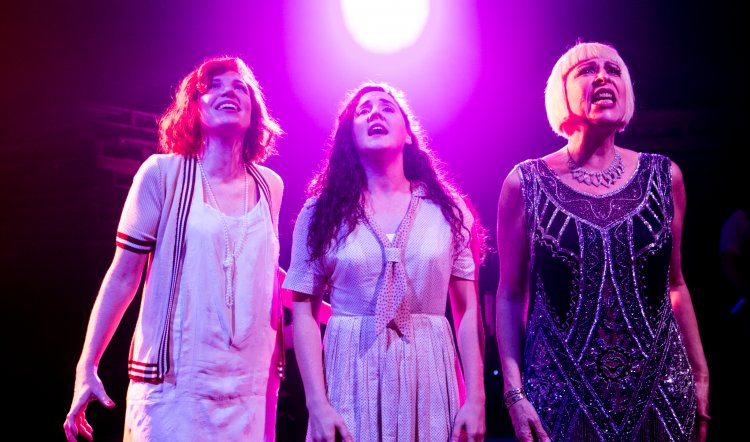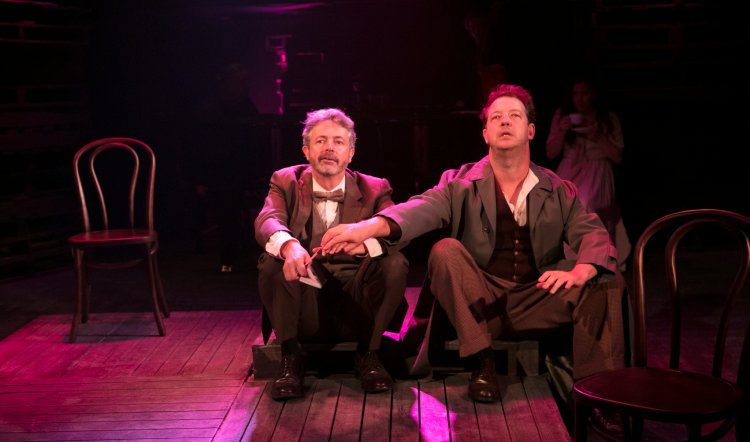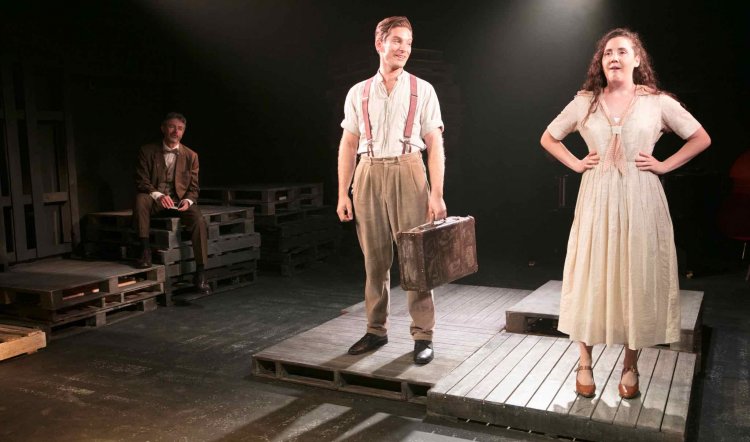
DARLINGHURST NIGHTS
DARLINGHURST NIGHTS, Hayes Theatre Co at the Hayes Theatre, 9 January- 3 February 2018. Photography by Brett Boardman: above - Billie Rose Prichard, Baylie Carson and Natalie Gamsu; below - Sean O’Shea and Justin Smith; below again - Sean O'Shea, Andrew Cutcliffe and Baylie Carson
For many different reasons some opening nights have a special sprinkling of oofle dust and this was one of them. It’s partly because the show is somewhat legendary and partly because the original STC production opened exactly three decades ago. And also and a bit magically, at the rear of the stage composer Max Lambert was at the grand piano to play his own score again while in the audience was Katherine Thomson who wrote the book from Kenneth Slessor’s poems.
In retrospect, it was a remarkably precocious work to have been created by a pair of 30-year-olds. And it’s remarkable now. In a time of glitzy, often vapid mega-musicals, Darlinghurst Nights is just the opposite. In bringing to minor-key life the Depression-era characters and stories of the Cross and Darlo, the piece is a tough-tender threnody for times, places and people long lost. And lost not only to our time, but to the poet too as Slessor was looking back two decades as he wrote.
Ken (Sean O’Shea) observes life on the dark streets and dingy pubs and boarding houses, notebook in hand, intent on capturing the everyday lives around him. Yet he is remembering, because those streets and its city have changed and Joe (Justin Smith) his knockabout friend, is long dead – drowned mid-harbour when he went overboard from a ferry, overcoat pockets laden with bottles of beer.
As the show begins, playwright Thomson draws Joe out of the shadows and back to the life of Slessor’s mind by interweaving the poetry of the title collection and, in particular, the famous Five Bells, which commemorates Joe and ends:
“... tried to hear your voice, but all I heard / Was a boat's whistle, and the scraping squeal / Of seabirds' voices far away, and bells, / Five bells. Five bells coldly ringing out. / Five bells.”
The rest of this lengthy meditation on the city, its harbour and how it bordered and was then intimately part of the daily toil is strongly drawn and spoken in the play while Ken draws other word pictures of his neighbours and street characters. There is country girl Mabel (Baylie Carson), giddy with excitement at escaping Molong (!!) She is befriended by Frank (Andrew Cutcliffe) after falling wide-eyed victim to a con man. Frank too has come to the city but with the pragmatic knowledge that his family farm couldn’t support both he and his brother through another drought.

On the socially “other” side of the street are Spud and Cora (Abe Mitchell and Billie Rose Prichard). He an incompetent small time crook, she a street tart who loves her man, despite his easy resort to fists and bullying, and longs to get off her back and into a gainful life. And there’s Rose (Natalie Gamsu) whose green Rolls Royce, jewels and furs mark her out as a “colourful Kings Cross identity”, but one with uncomfortable secrets.
The actors have been gifted with vivid, three-dimensional characters and the casting of each is spot-on – they are superb. Baylie Carson charms as the guileless girl you can take out of Molong, but her innocence is tempered by good sense and you obviously can’t take Molong out of the girl.
Billie Rose Prichard’s Cora – long ago robbed of her innocence in the Darlo alleys – is nevertheless a powerhouse of hopes and dreams and her yearning for love and a place in the sun is heartbreaking.
Heartache at the other end of life’s spectrum is delivered by Natalie Gamsu whose glitter and airs and graces are slowly revealed as a sham. Beneath the furs and behind the haughty demeanour is another facade that crumbles before our eyes taking with it her pride and bravado. Wondrous.
The men are up there with these powerful portrayals, however, and led by Justin Smith. His ordinary bloke appeal is matched by a twinkly charisma that makes plausible why he can cadge a beer, put his hand out for a “lend” of five bob and still be fondly remembered. On top of that, Thomson crafted an underlying knowing pessimism into the laughing maverick: did he fall or did he jump? The five bells will never tell.
As the lugubrious poet Sean O’Shea has the somewhat thankless task of being the rock on which the others hang their more eye-catching characters. As well as fulfilling that purpose he brings pensive sadness and wry humour to Ken and his droll demeanour is a fine foil for Joe’s rougher mien.

The two younger men are light and dark, sun and moon. Andrew Cutcliffe’s Frank is the good-natured all-Aussie chap whose solid decency will one day make some woman a good husband. His smile is open, as is his heart, and you hold your breath waiting for it to be broken.
in contrast Abe Mitchell’s Spud is a tricky piece of work. He’s wily and knowing but beneath it, dumb and stubborn as a brick and as dangerous, in the wrong hands. He literally wears his vaunting ambition in the form of an outfit that was once sharp but whose jacket is now frayed with one shoulder seam having popped and spewed the padding.
The costumes for each character are equally excellent and apposite – respectable cotton dresses for Mabel, greater sophistication but equally cheap tat for Cora and excessively glamorous glitter for Rose. The men, meanwhile, are properly clad in the suits, ties, weskits and braces of the Mother Country and it’s a wonder the sweaty pong of 1930s underarms and infrequent laundering isn’t visible in the air. Designer Mason Browne is also responsible for the simple setting of haphazardly stacked wooden pallets and these, together with Trent Suidgeest’s lighting make for an atmospheric place of imagination.
The music and songs – merry and melancholy by turns – thread in and out of the narrative. Max Lambert’s subtle piano provides both accompaniment and washes of colour with sideman Roger Lock on double bass and everything else including amplified tin bath of water (very effective harbour sound).
Director Lee Lewis has been faced with the formidable task of working with the show’s originators as well as her first musical and she’s crafted a poignant, slyly humorous and beautifully performed piece. It’s a show at once intelligent, understated and rich with the unexpected maturity of Thomson and Lambert’s early work. Deeply and satisfyingly Australian theatre. Loved it.



